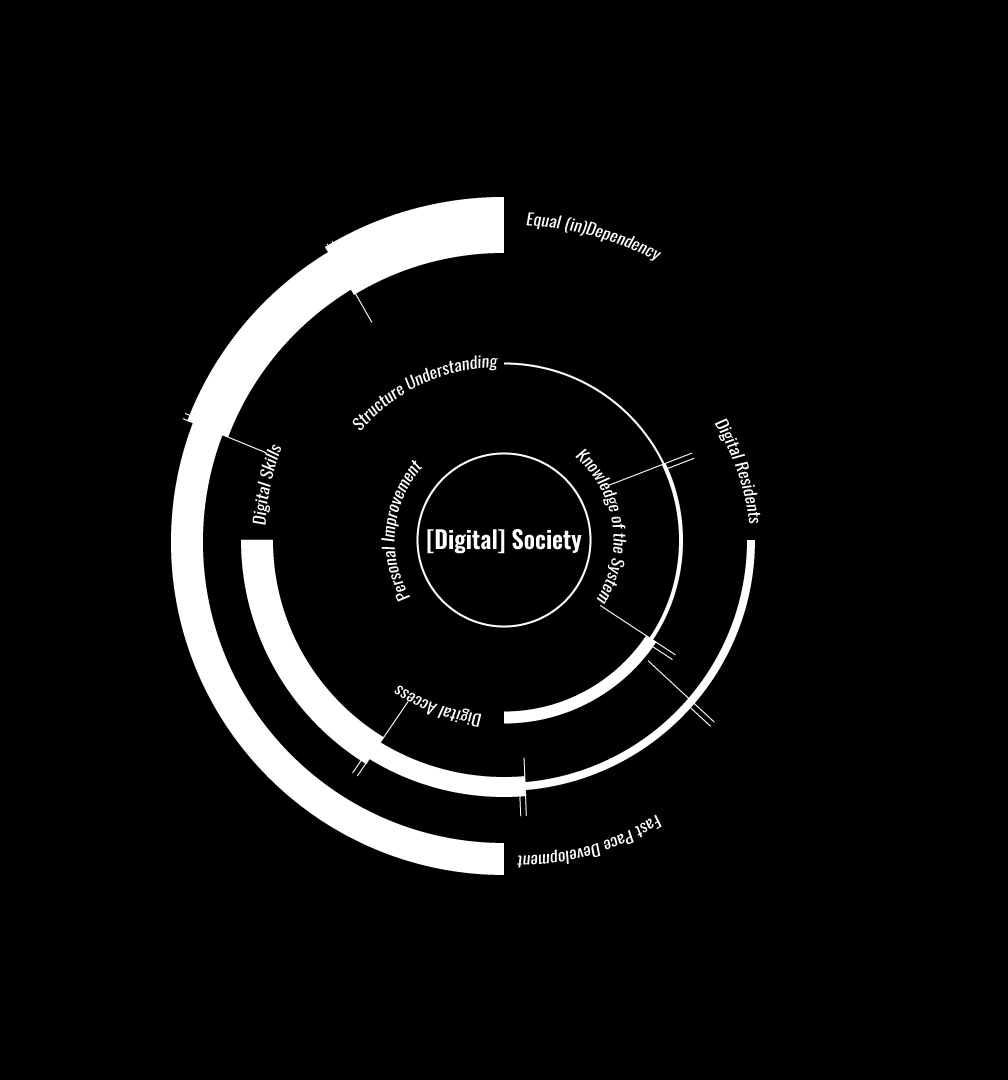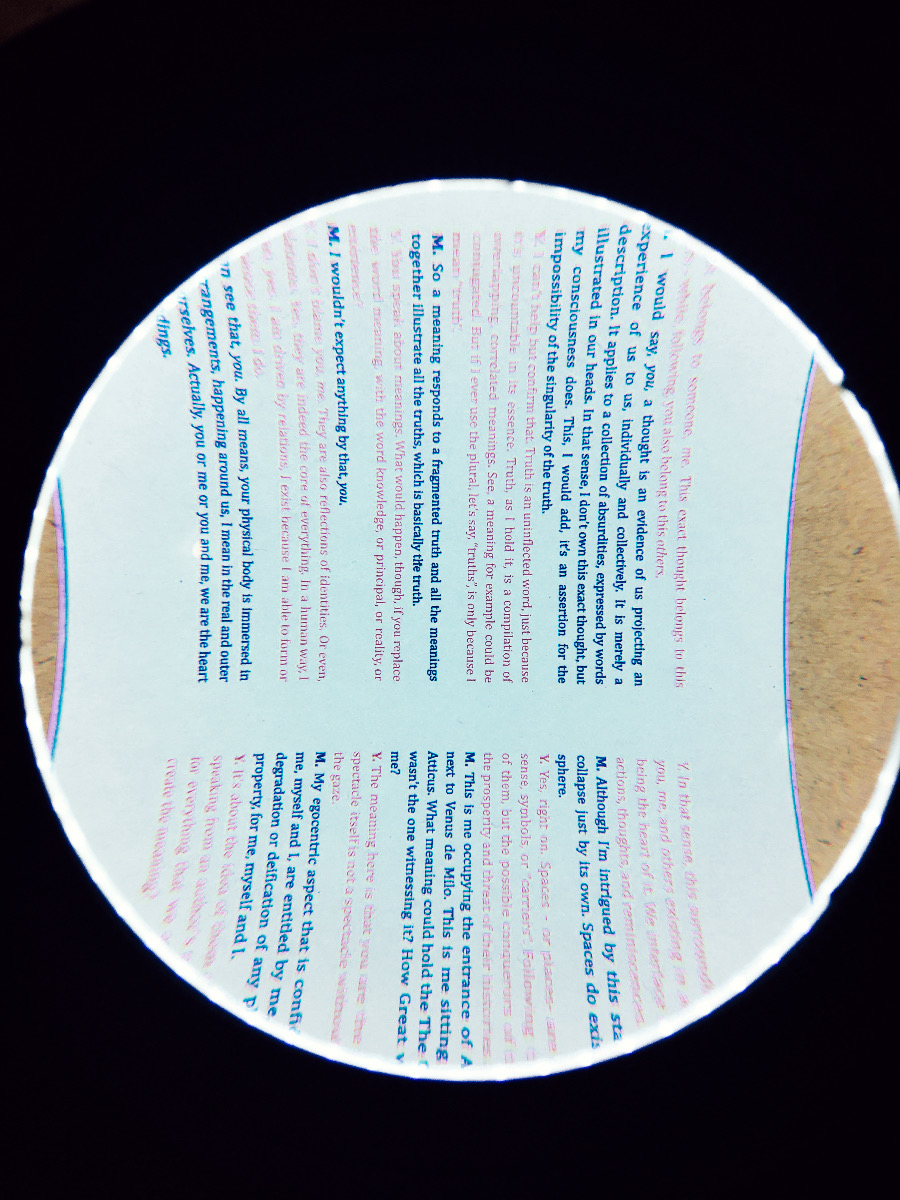selected writings
Project title:
In Common Bodies
//Reflections in paradigms
//Reflections in paradigms
November, 2019 - March, 2020
We (me, you, he, she, us, you, they) act as a paradigm, as a hyper whole not under a name. My paradigm or your paradigm resonates in our surroundings and reflects back on what we cannot keep control of; any meaning could be gained only under specified conditions. (Public) space is a paradigm, paradigm gets to be a paragon, and paragon becomes a reality.
The project investigates the notion of public space through the lens of a microscope. The microscope here is used as a metaphor for the microscale of the examination, which is orientated towards the smallest scale possible in an attempt to reach a larger scale and has a literal translation on the setting of the project. Different scales narrate the significance of the internality (inner reality) as a fragment of collectivity (outer reality), which -for the here and for the now- are considered an inseparable factor on the understanding of space, place, private, and public.
Dialogue is the tool that leads the subject of this investigation. It is considered as an embodiment of re-membering, in the sense of encountering, thinking, and recognizing. Two synchronized bodies are the two participants of the dialogue, in a written form. The two characters, me and you, are occupied with questions; (any) me and (any) you came together to converse and reciprocate, in an act of communication.
The project investigates the notion of public space through the lens of a microscope. The microscope here is used as a metaphor for the microscale of the examination, which is orientated towards the smallest scale possible in an attempt to reach a larger scale and has a literal translation on the setting of the project. Different scales narrate the significance of the internality (inner reality) as a fragment of collectivity (outer reality), which -for the here and for the now- are considered an inseparable factor on the understanding of space, place, private, and public.
Dialogue is the tool that leads the subject of this investigation. It is considered as an embodiment of re-membering, in the sense of encountering, thinking, and recognizing. Two synchronized bodies are the two participants of the dialogue, in a written form. The two characters, me and you, are occupied with questions; (any) me and (any) you came together to converse and reciprocate, in an act of communication.
The demarcation of each speaker is stated by his position. Everyone gets a pen. Blue is me, pink is you. Black pen is excluded; it’s superior permanence will pauperise any meaning meant to be meaningful.
Theoretical Practice
Could a universal dimension of experiencing Public Space ever exist? This is a story editing on how I disclaimed something I have never owned.
Could a universal dimension of experiencing Public Space ever exist? This is a story editing on how I disclaimed something I have never owned.
1st attempt
Thursday. 7 a.m. I am boarding a ship with orange funnels and I’m heading to
2nd attempt
Thursday. 7 a.m. I am boarding a ship with orange funnels and I’m heading to
3rd attempt
Thursday. 7 a.m. I am boarding a ship with orange funnels and I’m heading to find a seat. Once I’m settled in, I am starting to re-member the presence of my existence. This presence is signified by a movement, through which curt, chill breezes, wrapped in the trolleys of luggage that move around, are being transmitted. Α blurry - but well synchronized - murmur seems to also follow this movement around the seats. I stand up and enter this rambling movement, until I find a unique rhythm of movement and change direction, only to lead myself to the open deck. I remove the objects that I carry with me to remind me that I participate in movements and get myself comfortable on a bench. I crab a pencil from the left pocket of the jacket that is covering me and write down a collection of ideas on a piece of paper.
Essay on “User as Citizen”
The complex of changing systems of power and self-autonomy.
The complex of changing systems of power and self-autonomy.
December, 2019
guided by Vincent Thornhill
guided by Vincent Thornhill
How should we understand the role of technology and digitality in shaping societies? It’s only fair to have as a starting point, that we, the members of societies, are now, since the last decade to today, well immersed in a technological way of thinking and interpreting the world. By appropriating the term “digital technology”, we weave our multiple actions and current norms of our common living. We experience our constant shaping through our practices and our entanglement with other cohabitants in the societies. Even better, we encounter our shaped interpretation of our reality in the (co)habitant’s formations in structures of functioning and co-existing—meaning clustered power. As Foucault explained in his theory about power-knowledge, the ways we live, think and act are shaped by structures of power. He defines power as a structural expression of "a complex strategic situation in a given social setting"[1]. The imperative complexities, that reside in the relationship between us and our common structures, define, categorize and classify our existence in the societies. Thinking about our interconnections in societies and changes through time, considering our current experience with digitality being part of the frame and the index of our societies, our relationships will be free “if they open our human existence to the essence of technology”[2].
Even though we understand this power as a dominant imposition, in fact, we wouldn’t realise and experience our social existence without it. Still, and following the emergence of technology (that resulted in a newly introduced digital aspect of our reality) there is a gap we need to gain an understanding of and overcome, in order to fully and consciously participate in our fabricated systems. This gap could be determined by an inquiry on our inherent tendency for autonomy and self-control. Since we are forced to participate in an independent system, that regulates our actions and practices, but we do not entirely possess self-recognition of our role and understanding of the way and the extent of our participation, we ask, is there still any room for our freedom?
Full essay here.


